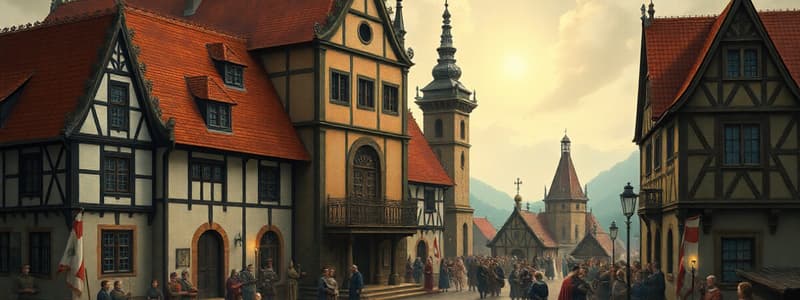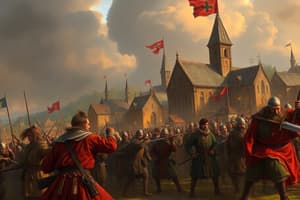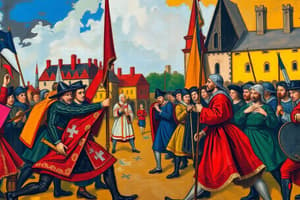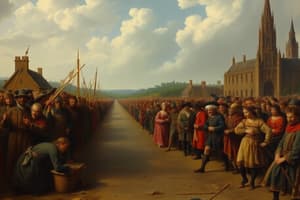Podcast
Questions and Answers
What event triggered the outbreak of conflict in 1618?
What event triggered the outbreak of conflict in 1618?
- The joining of the Lutheran and Catholic leagues
- The ascension of Ferdinand II to power
- The closure of Protestant churches (correct)
- The formation of the Protestant Union
Which group led the resistance against Ferdinand II's rule in Bohemia?
Which group led the resistance against Ferdinand II's rule in Bohemia?
- The Protestant Union (correct)
- The Habsburgs
- The Holy Roman Empire
- The Catholic League
Who was the head of the Habsburg family during the early 17th century?
Who was the head of the Habsburg family during the early 17th century?
- Maximilian I
- Frederick II
- Maria Theresa
- Ferdinand II (correct)
What characterized the political landscape of Germany at the time of the Protestant revolt?
What characterized the political landscape of Germany at the time of the Protestant revolt?
What was a key factor that led to the formation of alliances during this period?
What was a key factor that led to the formation of alliances during this period?
What was the main political affiliation of Richelieu during the years leading to 1635?
What was the main political affiliation of Richelieu during the years leading to 1635?
Which European country was primarily focused on upsetting the balance of power in France during Richelieu's tenure?
Which European country was primarily focused on upsetting the balance of power in France during Richelieu's tenure?
What year is closely associated with the significant political actions taken by Richelieu?
What year is closely associated with the significant political actions taken by Richelieu?
What was a major focus of Richelieu's foreign policy?
What was a major focus of Richelieu's foreign policy?
How did Richelieu's leadership style affect the political landscape of France?
How did Richelieu's leadership style affect the political landscape of France?
What event significantly influenced the Thirty Years' War?
What event significantly influenced the Thirty Years' War?
During the Thirty Years' War, what characterized the first twelve years?
During the Thirty Years' War, what characterized the first twelve years?
What was one of the outcomes of Ferdinand hiring a large army?
What was one of the outcomes of Ferdinand hiring a large army?
What were the two main phases of the Thirty Years' War?
What were the two main phases of the Thirty Years' War?
What strategy did Ferdinand II employ to fund his army?
What strategy did Ferdinand II employ to fund his army?
What was the primary conflict during the Thirty Years' War rooted in?
What was the primary conflict during the Thirty Years' War rooted in?
What year marked the beginning of the Thirty Years' War?
What year marked the beginning of the Thirty Years' War?
Which figure was significant in shifting the tide of war against the Hapsburgs?
Which figure was significant in shifting the tide of war against the Hapsburgs?
What is the historical context surrounding the Hapsburg triumph?
What is the historical context surrounding the Hapsburg triumph?
What was one expectation of Absolutist Monarchs in Europe?
What was one expectation of Absolutist Monarchs in Europe?
Which of the following regions was primarily affected during the conflict involving the Hapsburgs?
Which of the following regions was primarily affected during the conflict involving the Hapsburgs?
In what way did the war impact the Protestant forces?
In what way did the war impact the Protestant forces?
What can the defeat of the Hapsburgs indicate about the political dynamics of the time?
What can the defeat of the Hapsburgs indicate about the political dynamics of the time?
Which military characteristic is associated with the shifts during the conflicts involving Gustavus Adolphus?
Which military characteristic is associated with the shifts during the conflicts involving Gustavus Adolphus?
How did the outcomes of the conflicts affect the future of Absolutism in Europe?
How did the outcomes of the conflicts affect the future of Absolutism in Europe?
Which event is marked by significant Protestant military success during the European conflicts?
Which event is marked by significant Protestant military success during the European conflicts?
What was a primary motivation behind the actions of the Hapsburgs during the conflicts?
What was a primary motivation behind the actions of the Hapsburgs during the conflicts?
Flashcards
Event triggering 1618 conflict
Event triggering 1618 conflict
The closure of Protestant churches in Bohemia.
Bohemian resistance leader
Bohemian resistance leader
The Protestant Union.
Habsburg head (early 17th)
Habsburg head (early 17th)
Ferdinand II.
German political landscape
German political landscape
Signup and view all the flashcards
Alliance formation factor
Alliance formation factor
Signup and view all the flashcards
Richelieu's political role
Richelieu's political role
Signup and view all the flashcards
European power unsettling France
European power unsettling France
Signup and view all the flashcards
Richelieu's significant year
Richelieu's significant year
Signup and view all the flashcards
Richelieu's foreign policy focus
Richelieu's foreign policy focus
Signup and view all the flashcards
Richelieu's leadership impact
Richelieu's leadership impact
Signup and view all the flashcards
Significant Thirty Years' War influence
Significant Thirty Years' War influence
Signup and view all the flashcards
Early Thirty Years' War
Early Thirty Years' War
Signup and view all the flashcards
Ferdinand's army funding
Ferdinand's army funding
Signup and view all the flashcards
Thirty Years' War phases
Thirty Years' War phases
Signup and view all the flashcards
Thirty Years' War root
Thirty Years' War root
Signup and view all the flashcards
Thirty Years' War start year
Thirty Years' War start year
Signup and view all the flashcards
Turning point against Hapsburgs
Turning point against Hapsburgs
Signup and view all the flashcards
Hapsburg triumph context
Hapsburg triumph context
Signup and view all the flashcards
Absolutist Monarch expectation
Absolutist Monarch expectation
Signup and view all the flashcards
Primarily affected region
Primarily affected region
Signup and view all the flashcards
Protestant forces impact
Protestant forces impact
Signup and view all the flashcards
Hapsburg defeat's meaning
Hapsburg defeat's meaning
Signup and view all the flashcards
Military shift characteristic
Military shift characteristic
Signup and view all the flashcards
War outcomes's Absolutism impact
War outcomes's Absolutism impact
Signup and view all the flashcards
Significant Protestant success
Significant Protestant success
Signup and view all the flashcards
Hapsburg motivation
Hapsburg motivation
Signup and view all the flashcards
Study Notes
The Thirty Years' War
- The Thirty Years' War was a religious conflict in Europe that lasted from 1618 to 1648.
- The war began after a Protestant rebellion against the Catholic emperor Ferdinand II in Bohemia.
- The war can be divided into two phases: Hapsburg Triumphs and Hapsburg Defeats.
- The Hapsburg triumphs occurred from 1618 to 1630, during which armies from Austria and Spain crushed the Czech uprising and defeated the German Protestants.
- Ferdinand II paid his army of 125,000 men by allowing them to plunder German villages.
- The Hapsburg defeats occurred in 1630 when Gustavus Adolphus of Sweden and his army shifted the tide of the war.
- Cardinal Richelieu, a powerful minister for Louis XIII of France, saw an opportunity to weaken the Hapsburgs and France joined the war against them.
- The Treaty of Westphalia, signed in 1648, ended the Thirty Years' War.
- Although the war ended with a peace treaty, it caused widespread destruction and devastation across Europe.
- The war resulted in the deaths of over 20 million people, and Germany did not become a unified nation.
The Peace of Westphalia
- The Treaty of Westphalia ended the Thirty Years' War in 1648.
- The Treaty of Westphalia had a major impact on the religious and political landscape of Europe.
- The treaty recognized the sovereignty of European states and the principle of religious toleration.
- It also established a system of international relations based on diplomacy.
- The Treaty of Westphalia was a significant turning point in European history and it marked the end of the medieval world and the beginning of a new era of state-centered diplomacy.
Studying That Suits You
Use AI to generate personalized quizzes and flashcards to suit your learning preferences.




